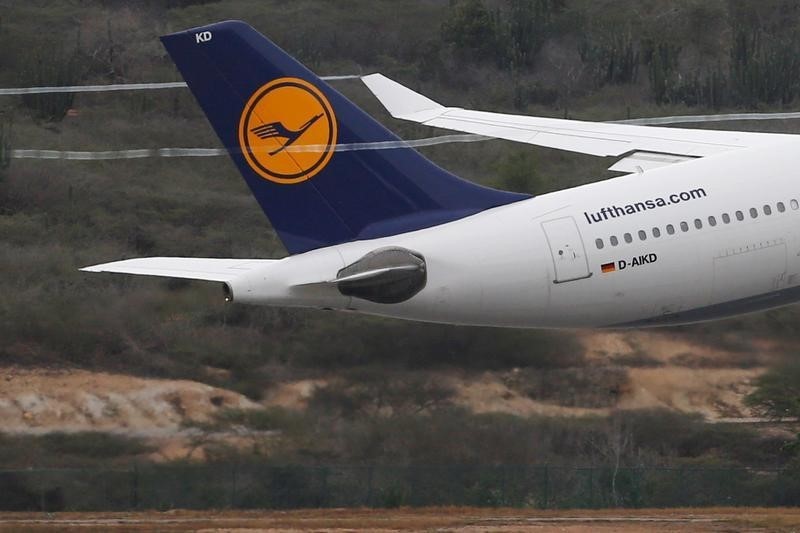Stock market today: Nasdaq closes above 23,000 for first time as tech rebounds
Investing.com -- Lufthansa Group (ETR:LHAG) on Thursday has reported a decline in its full-year operating profit for 2024, citing a combination of strikes, rising costs, and delays in aircraft deliveries as key factors that impacted its financial performance.
Despite posting record revenues, the airline faced significant pressures that weighed on profitability.
The group generated an operating profit of 1.6 billion euros for 2024, a sharp drop from the 2.7 billion euros reported the previous year.
Its operating margin also declined to 4.4 percent from 7.6 percent in 2023. According to the company, strikes alone cost Lufthansa Group around 450 million euros, while lower average ticket prices and higher operational expenses also hit earnings.
Net profit, however, fell less steeply, reaching 1.4 billion euros, down from 1.7 billion euros a year earlier, partly due to lower interest costs.
Passenger numbers grew by 7 percent to 131 million, with a record load factor of 83.1 percent. The summer months of July and August saw near-88 percent occupancy, among the highest in the company’s history.
However, yields declined by 2.6 percent due to increased industry-wide capacity, with the sharpest drop—nearly 10 percent—seen in the Asia-Pacific region.
Unit costs also rose by 1.9 percent due to inflation in personnel and material expenses, further squeezing margins.
Lufthansa’s flagship airline bore the brunt of the downturn, with earnings falling by 948 million euros. Delayed aircraft deliveries forced it to keep older planes in operation for longer, contributing to higher costs.
Other subsidiaries fared better. Swiss International Air Lines nearly matched its record profit from 2023, Eurowings maintained its previous year’s performance, and Brussels Airlines posted its highest-ever profit of 60 million euros. Austrian Airlines also turned in a profit, reporting an Adjusted EBIT of 76 million euros.
Lufthansa Airlines is undergoing a turnaround program aimed at improving efficiency, simplifying operations, and boosting service quality.
The company has already seen progress in punctuality and operational stability in early 2025. By 2026, the program is expected to yield an additional 1.5 billion euros in earnings, rising to 2.5 billion euros by 2028.
The group’s maintenance and cargo businesses performed well. Lufthansa Technik capitalized on increased demand for aircraft maintenance, securing new contracts worth 7.5 billion euros and posting a 635 million-euro profit. Lufthansa Cargo also saw a recovery, generating a profit of 251 million euros, with strong e-commerce demand from Asia driving performance.
Lufthansa ended the year with an adjusted free cash flow of 840 million euros, significantly lower than the 1.8 billion euros reported in 2023.
The company’s available liquidity increased to 11 billion euros, while net debt remained stable at 5.7 billion euros. Pension liabilities declined slightly to 2.6 billion euros.
The airline expects 2025 to be a transitional year as it focuses on stabilizing operations and setting the stage for future profitability.
The company forecasts moderate capacity growth of around 4 percent and aims to improve revenue while continuing its fleet renewal program.
“Lufthansa has the oldest fleet in our coverage and the lowest margins. While fleet delivery should ultimately drive margin recovery, the exposure to Boeing (NYSE:BA) could delay progress,” said analysts at Jefferies in a note.
With new aircraft deliveries expected every two weeks, Lufthansa says its long-term strategy remains on track. However, it warned that cost pressures and delays in aircraft deliveries will continue to pose challenges.
The company’s annual shareholder meeting in May will include a proposal for a dividend of 0.30 euros per share, in line with the previous year. The dividend yield stands at nearly 5 percent based on year-end share prices.
Lufthansa is also integrating ITA Airways, expanding its multi-brand strategy. The process, expected to be completed in 18 months, will add 100 aircraft and 5,000 employees to the group.
Despite ongoing challenges, Lufthansa expects a stronger financial performance in 2025, projecting a "significantly higher" Adjusted EBIT than in 2024.
The company is banking on high travel demand, fleet modernization, and cost-cutting measures to steer it back toward profit growth.
